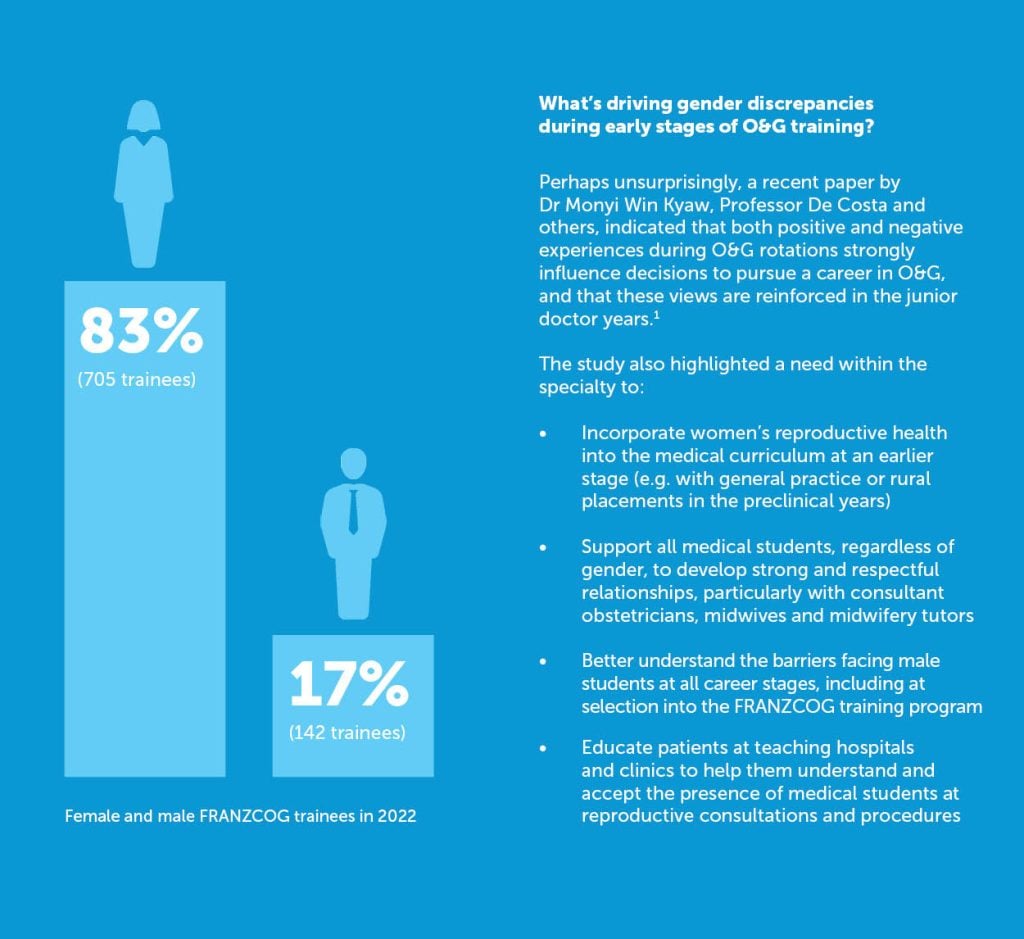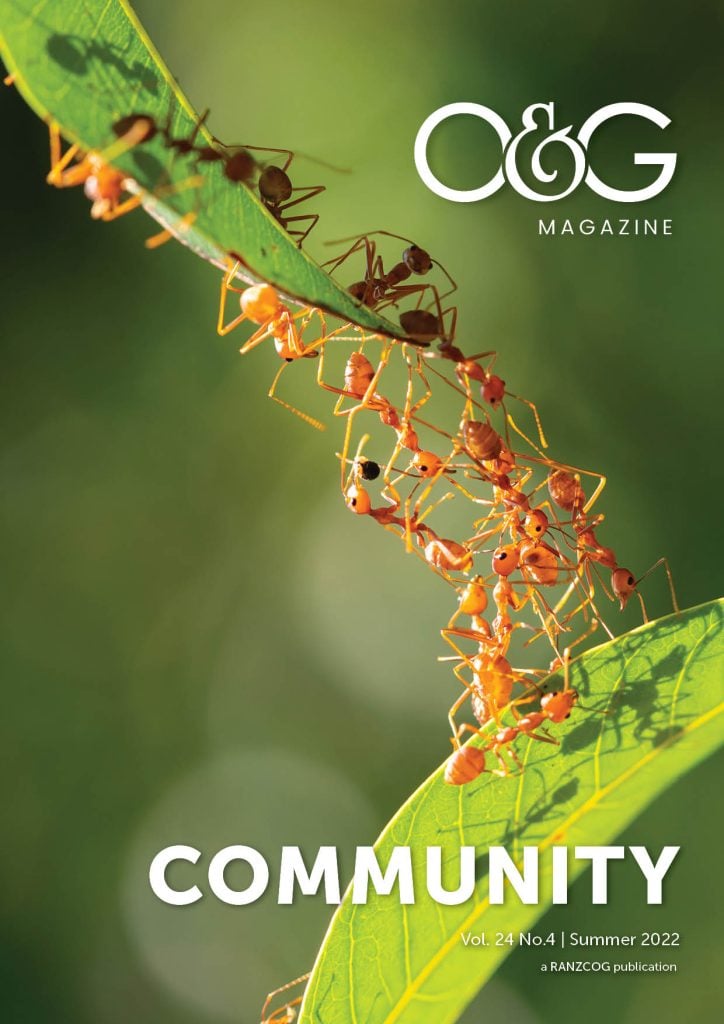For most of our readers, Professor Caroline de Costa probably requires little introduction. Australia’s first female Professor of Obstetrics and Gynaecology. Women’s health trailblazer. Mother of seven. Prolific non-fiction and crime-fiction author. These are just a few titles (or perhaps we should say, ‘aliases’) that spring to mind.
When O&G Magazine last caught up with Professor de Costa (Vol.23 No 4, Summer 2021), during the height of the COVID-19 pandemic, she had just published an autobiographical book, The Women’s Doc, and was hoping to take it on tour. Among other non-literary commitments, she was also contemplating the next book in her Cass Diamond crime-fiction series.
In keeping with the theme of ‘community’, we chatted with Professor de Costa one year on about her committee involvement, teaching activities and creative writing process.
Paying it forward
Since stepping away from clinical practice in 2016, Professor de Costa has continued to share her expertise with the College, and the wider O&G community. She currently sits on a number of RANZCOG committees, including:
- Gender Equity and Diversity Working Group
- Historical Collections Committee
- Sexual and Reproductive Health Special Interest Group
- Women’s Health Committee
And while she now calls Melbourne home, Professor de Costa also remains keenly invested in shaping the next generation of O&G professionals as a teacher and supervisor at James Cook University in Cairns – a role that she notes presented numerous challenges during the recent move to online learning, particularly given the “very three-dimensional nature of pregnancy and birthing.”
At the other end of the spectrum, Professor de Costa points to the achievements of two of her students – a PhD and an honours candidate – who completed and submitted their research projects for assessment in 2022. Both overcame considerable obstacles and last-minute adjustments to research methods along the way.
One of these projects was conducted in conjunction with the RANZCOG Gender Equity and Diversity Working Group, and involved two FRANZCOG trainees, Dr Helena Obermair and Dr Hon Chuen Cheng. The study explored perceptions of gender discrepancies among medical students and junior doctors in O&G (see below).

Box 1. Findings from Professor de Costa’s study with the RANZCOG Gender Equity and Diversity Working Group
Today, more than 80% of applicants accepted into the FRANZCOG training program are female. Back in 1974 when Professor de Costa first applied to become an O&G registrar in Sydney, this number was zero.
As someone who helped to pave the way for this remarkable change, Professor de Costa remains a strong advocate for gender parity within O&G leadership roles. However, she also firmly believes that everyone should feel equally welcome within the field, regardless of gender.
Medical and creative licenses
For those who have dabbled in academic writing, a transition to crime fiction might seem like quite a leap. But for Professor de Costa, it was somewhat of a natural progression. She recalls a particular experience writing fictionalised patient case studies with a long-time friend from medical school in Ireland. The content was not only well-received, but also enjoyable to write, and it planted a creative seed.
These days Professor de Costa carves out time to write around a busy work, travel and social schedule, which means that her creative process tends to ebb and flow. “Inspiration can come in unexpected places, like the supermarket,” she says. “It will stimulate a period of writing and may also trigger adjustments to existing details of the story.” So, the plot, and the ending, are subject to change.
One aspect that Professor de Costa does have locked down though is a trusted network of reviewers and sense-checkers. For example, one friend who works in the Criminal Investigation Branch (CIB) helps to ensure that her descriptions of police matters are accurate and realistic, from search warrants, right down to the make and model of police vehicles. And of course, she has most of the murderous medical details covered.
Write what you know
To date, there are four books in the Cass Diamond series: Double Madness (2015), Missing Pieces (2018), Blood Sisters (2019), and a prequel titled Hidden Lives (2021). All are set in Far North Queensland, a region that Professor de Costa knows well, having spent 15 years working at Cairns Hospital and travelling to remote outreach clinics on the Cape York Peninsula. Against this steamy tropical backdrop, Cass Diamond unravels mysteries intertwined with themes such as psycho-sexual depravity, race and ethnicity, sex-trafficking and abortion.
Similarly, Detective Cass Diamond – the Indigenous female protagonist – is born out of clinical and personal experience. “I thought long and hard about writing from the perspective of an Aboriginal woman,” she says. “But the character is based on the many strong, smart, talented women I’ve met, and it’s an important narrative.”
In the early 1990s, prior to her move north to Cairns, Professor de Costa also established the first specialist obstetric, gynaecology and women’s health clinic at the Aboriginal Medical Service in Redfern, Sydney.
Crime never sleeps
So, what’s next for Professor de Costa? After a false start due to the pandemic, she is currently travelling abroad to promote The Women’s Doc in Ireland, where she says the book has done “unexpectedly well.” Although perhaps this shouldn’t come as such a surprise given that Professor de Costa built her early career and reputation as a women’s health trailblazer in Dublin in the 1960s and 70s.
From Ireland, Professor de Costa is heading to Canada to spend time with her son, and a Palestinian refugee family who she first met in Cairns through her work supporting refugee and asylum-seeker women for over three decades. Both families know her as grandmother to their children.
And as for Detective Cass Diamond? Professor de Costa’s fifth book is nearing completion. A few more trips to the supermarket for inspiration might just do the trick… so watch this space!
Reference
- Win Kyaw M, et al. Aust N Z J Obstet Gynaecol. 2022 Nov 5. doi: 10.1111/ajo.13617. Online ahead of print.






Leave a Reply